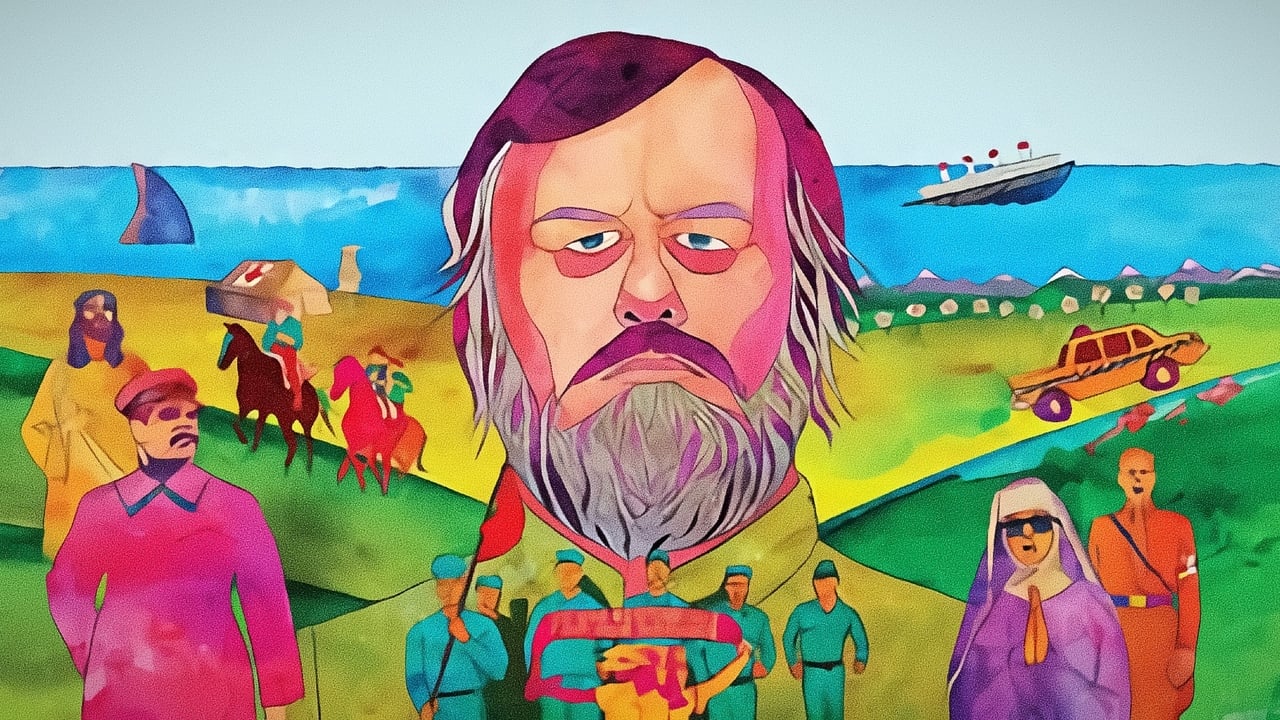

Sophie Fiennes' film, 'The Pervert's Guide To Ideology', is essentially just an illustrated lecture, given by Slovenian philosopher Slavoj Zizek. The illustrations come from the movies, but in the main, Zizek isn't interested in the ideologies of the film makers - rather, he uses selections from the films' content as illustrative of the processes of real life, and the ideology he is interested in is not Nazism, or communism, but rather the way we all frame our own lives, and the universal themes linking our need for and use of such frames. Some of this universalist framework comes from psychoanalysis, although Zizek's Freudian perspective only really manifests itself in occasional unproven assertions that the it is the analytic process that has revealed the truth. Finnes shoots this well, and Zivek is intermittently interesting, but overall, the message is both highbrow and yet strangely unrevalatory; I found it hard to understand what I was meant to take away from this film, or in other words, what the film's own ideological case actually was. It's almost better enjoyed as a simple piece of discursive criticism than a coherent (or, for want of a better word, we might say "ideological") discussion of ideology.
... View MoreLike The Pervert's Guide to Cinema, the second installment in what one might hope will be a series (though who knows what else the man can say about what else in the world with the medium of cinema and so on), Slavoj Zizek commands the screen in a documentary-cum-performance piece that is him trying to use movies and also propaganda films in this case to illustrate a thesis about Ideology. Of course, ideology can mean a lot of things in the world, so he has to make sure his points come across. And he has a ton of them. But the main one I think is presented right up front (They Live) and then subsequently the final film discussed in depth (Seconds) makes the point about what it means to live your life in a certain way and then for that life to be turned completely upside down. Whether it's putting on - or fighting a guy for 9 minutes to put on - a pair of sunglasses as an "ideology critique machine", or putting on a new face to get a new identity - what ideology means in this context is... how are we told to exist in society, who are we subservient to or have to look up to, and what does society do to keep the wheels moving? Zizek certainly doesn't pick anything obscure, and of course this is one of the keys to possibly, maybe, bringing in people who have no idea who this man is or what his many philosophy books espouse (i.e. Less Than Nothing, Welcome to the Desert of the Real, etc). In fact he goes more mainstream in some ways than in 'Cinema', which had more art-house directors (Kieslowski, von Trier, Tarkovsky, Haneke). Here it's big guns like Spielberg (Jaws), Scorsese (Last Temptation in a really big set piece, which I'll mention again in a moment, and Taxi Driver), Cameron (Titanic), and stuff like the Dark Knight, The Sound of Music, West Side Story, etc. The main consistent director carried over, at least for a couple of points regarding Beethoven and how to function in the military system, is Kubrick, but then how could he not be.The effect of this is that we see how in THE most popular cinema of the world, the films that have made by and large the most money, the messages conveyed carry a lot of significance, sometimes of the hidden sort underneath the exterior of high-class entertainment. He juxtaposes this with a movie like The Eternal Jew, which was a Nazi movie to show what the Jewish people were "really" like in society, but making a clear point that is shown: when dealing with a big "other" like a racist regime, you point out the highly intelligent intellectuals and the scummy filth; the enjoyment of life and the need to make enjoyment unattainable for others. In fact this concept of the "Big Other" is a cornerstone of the film. Hell, if you can buy into it, that's what Bruce the Shark is all about in Jaws.The key thing that carries the film, aside from how Zizek has the most uncanny, strange but fascinating ability to keep one's attention through his screen presence (he looks like a college professor, albeit often put into the clothes and set pieces from the movies as was Perverts Guide part 1), is just the quantity of things to ponder. I've seen the movie three times now and only now feel like I've grasped most of what he's talking about. This is not to say it's too dense on a first viewing so much as to say that you get such a massive spectrum on what society does with its people - how Capitalism and Communism have certain very similar structures, what music has a role in shaping ideology, the figures of single mothers and rioters in Britain respectively (but not by much), and ultimately what Christianity and Atheism have to do with one another.The Atheism part may be a tough to swallow; this was one of the things that kept me from fully loving the film the first time, not that I didn't get the theory, but it seemed borderline crap. But as I rolled around the concept, particularly with the scene presented from Last Temptation (the crucifixion scene of course), it was provocative and made me rethink how I see what a belief structure is. I don't know if the film will be as deep as it is for everyone, or if it's even as memorable as Perverts Guide to Cinema, which is THE study of David Lynch for, like, all time. But Zizek and Fiennes present an entertaining, sometimes very funny tableau (i.e. the Stalin line) and you get to see certain movies you may have not seen before and may want to once it's done, and so many questions come up: is there any way to change thinking about how we live and function? What do we do when we can't confide in others for fear of the "Big Other" concept? Do all fascist leaders love cats and small children? Things like that.
... View MoreI wasn't expecting much, I must say;I watched this movie because it was a gift of a magazine I bought and thought of giving it a chance.But at the first frame, I jumped up with enthusiasm;John Carpenter's They live is acknowledged as a masterpiece. Zizek is a very clever man and his remarks are brilliant.Furthermore, as the film unfolds, it becomes obvious that through the different topics there's a theory that is elaborated here, and it is so perfectly illustrated that it is better watched than read.I must say that I have read Zizek in the past, and I used to read a lot of Lacan, so I am acquainted with the ideas expressed, but I found them here expressed with such clarity, that impressed me and even influenced me, all the more since they fit with my way of thinking and the way I stand against Ideology.I even understood better why I am a devoted fan of John Carpenter and why I dislike Titanic and Nolan's Batman.Overall, a superb movie that makes you really think and consider things(Zizek is a brilliant thinker, lending his pair of glasses to look through), that does not cease to bring joy.An even resurrecting experience also, for which I am grateful.
... View MoreAs a philosopher Slavoj Zizek has impressive credentials and ideas worth studying. In this movie however, he seems to present a skeptics point of view on his opinion and subject which can be dangerous. Many the counter facts presented are just plain incorrect. The arguments are presented as a "Don't believe them, believe this" structure which is unusually, I'd expect a offering of information rather being told what to believe. The movie is worth watching if you're willing to follow up with your own research to get better information and answers than presented in this movie. If not, then viewing this movie alone is dangerous and it stands as irresponsible product.
... View More